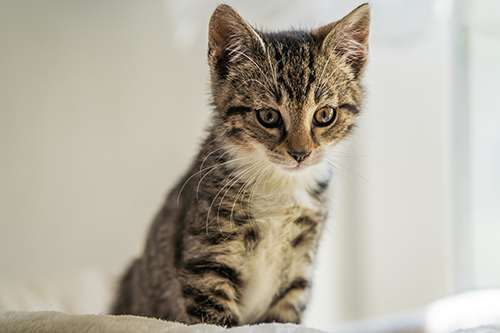
Gundula Vogel from Pixabay
Cats that are neutered at four months old compared to the traditional six months old are not at any greater risk of weight problems as they age, new research has found.
The research, published in Vet Record, that examined over 2,000 clinical records relating to 584 pet cats, showed no differences in the body condition score (BCS) and bodyweight of kittens that were neutered at four months or under, five and six months old as they reached adulthood and their senior years.
Researchers used data from the Bristol Cats study at the University of Bristol, a longitudinal study following kittens registered between eight to 16 weeks old throughout their lifetime, and part-funded by the UK's leading cat charity Cats Protection.
The study also found that male cats generally weighed more and had a higher BCS than females at any given timepoint. This was driven by seasonal effects, with female cats displaying lower BCS and bodyweights in the summer and autumn, while male cats remained more consistent in BCS throughout all seasons.
Hair length was found to be predictive of BCS but not bodyweight, potentially due to the subjectivity of BCS measurements. Long hair may distort perspective of cat body shapes, leading both owners and vets to perceive the fur to be responsible for more of the cat's size than it actually is. This highlights the benefits of using both BCS and bodyweight in clinical assessments and when formulating appropriate recommendations on nutrition and bodyweight management for cats.
The research follows calls for more long-term studies investigating health outcomes for cats neutered pre-pubertally by some in the veterinary profession.1 As neutering is a known risk-factor for obesity in adult cats, some are worried that neutering cats at younger ages may increase the size of this risk.
Dr Rae Foreman-Worsley, a feline welfare associate researcher for Cats Protection said: "This new study adds to a growing body of evidence that neutering cats at four months old does not compromise their welfare while it also helps charities and vet practices alike to deal with the problem of feline over-population.
"By neutering cats from four months old, the veterinary profession can help to significantly reduce the number of unplanned litters and potentially homeless cats. At a time when financial constraints and issues with capacity are facing both owners and vets, a move to neutering cats at four months old may be an effective way to manage cat populations."
Dr Emily Blackwell, Senior Lecturer in Animal Behaviour and Welfare, Director of Companion Animal Population Health and Principal Investigator of Bristol Cats study at Bristol Veterinary School, added: "The Bristol Cats study collects information about the health, welfare and behaviour of cats across the UK. Data from Bristol Cats used in this research provides further evidence that neutering kittens at four months of age does not put them at greater risk of weight problems in adulthood than those neutered at six months.
"Neutering kittens at four months can be effective in preventing unwanted litters, and we are pleased to have helped to provide scientific evidence to inform neutering decisions."
Cat Kind, a coalition of cat welfare organisations including Cats Protection, has published a summary of the scientific evidence about the advantages of neutering cats at four months old.
Vet practices can also access other resources on the Cat Kind website, including kitten neutering videos, a directory of UK veterinary practices that promote the neutering of cats at four months old and Cat Kind's Summary of Evidence document.
Paper
'Long‐term effect of neutering age on body condition score and bodyweight in domestic cats' by Rae Foreman-Worsley, Emily Blackwell, Lauren R. Finka, Elizabeth Skillings, Jenni L. McDonald in Veterinary Record [open access]






